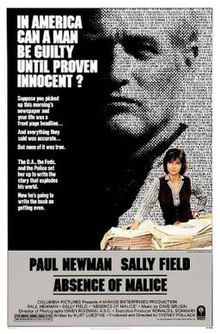Paul Newman and Sally Field star in Absence of Malice, Sydney Pollack’s controversial drama about the power of the press, written by former journalist Kurt Luedtke and dealing with reporters’ dangerous zeal and single-mindedness.
Grade: B- (**1/2* out of *****)
| Absence of Malice | |
|---|---|

Promotional poster
|
|
Some American films have portrayed journalists as cutthroat competitors (The Front Page, in its various versions), whereas others have stressed their roles as heroic sleuths (All the President’s Men).
Absence of Malice attempts but doesn’t succeed to depict an accurate picture of the profession’s conflicts and dilemmas.
Field plays an overly eager reporter who takes shortcuts around journalistic ethics and prints a story that injures an innocent businessman, Michael Gallagher (played by Paul Newman).
The film disregards the fact that most newspapers have established some safeguards to prevent such injustices. It’s too late when Field’s reporter says in the end, “The profession is worthy if well practiced;” by that time, she has lost credibility as a character and the audience sympathy as viewers.
Gallagher soothes the fears of his friend Melinda Dillon, a teacher in a Catholic school, who has admitted to a reporter that she has had an abortion. Field’s reporter causes damage to Teresa, behaving abominably, both professionally and personally “I am used to dealing with girlfriend,” she says early one, patronizingly, whereupon she proceeds to extract a painfully intimate confession from Teresa. She then threatens to print it and shows no patience for Teresa’s plea that this story will ruin her.
As Michael Gallagher, Newman is at his best in a role he has played throughout his career: The macho, alienated loner (he played similar roles in Hud, The Hustler, Fort Apache, the Bronx). Interestingly enough, Newman’s role was originally slated for Al Pacino. Here, as the innocent son of a known criminal, Newman excels in the role of the wronged businessman who gets his final revenge, but his acting did not get sufficient recognition Controversy over the film’s issues diverted attention from his performance.
Absence of Malice managed to make newspapers even more careless and compromised than they actually are.
Others criticized the movie’s attack on female reporters through the clumsy, seductive, and manipulative conduct of the journalist played by Field, who makes one mistake after another.
Absence of Malice should be used in journalism and public administration courses to illustrate professional errors and bad judgment made by reporters, such as writing a story without seeking confirmation, and worse, having a romantic relationship with your source of information.
Though the reviews were mixed, the film was a box office success.
It was the first picture in a long time that had cast Newman playing opposite a strong female co-star in a romantic vein.
Receiving a second Supporting Actress Oscar nomination, Melinda Dillon is particularly moving in two unforgettable scenes, set just before she commits suicide. The first occurs when she makes a confession about her abortion, The second take place, when she scampers across the lawns near her house, pathetically tries to snatch up the morning papers that will publicize her abortion.
The film is well acted by the leads as well as supporting ensemble, which includes Bob Balaban, Luther Adler, Josef Sommer, John Harkins, Don Hood, and Wilford Brimley.
My Oscar Book
Oscar Nominations
Best Actor: Paul Newman
Supporting Actress: Melinda Dillon
Screenplay (Original): Kurt Luedtke
Oscar Awards: None
Oscar Context:
The winner of the 1981 Best Actor Oscar was Henry Fonda for the melodrama On Golden Pond.
Maureen Stapleton won the Best Supporting Actress Oscar for Warren Beatty’s epic Reds.
The Original Screenplay Oscar went to Colin Welland for the British film “Chariots of Fire,” which also won the Best Picture.
Cast
Paul Newman as Michael Gallagher
Sally Field as Megan Carter
Bob Balaban as Elliott Rosen
Melinda Dillon as Teresa Perrone
Luther Adler as Malderone
Barry Primus as Waddell
Josef Sommer as McAdam
Don Hood as James K. Quinn
Wilford Brimley, Assistant U.S. Attorney General James Wells
John Harkins as Davidek
Credits
Released by Columbia
Produced and directed by Sydney Pollack
Screenplay: Kurt Luedtke; David Rayfiel (uncredited)
Camera: Owen Roizman
Editing: Sheldon Kahn
Music: Dave Grusin
Production design: Terence Marsh
Costume design: Bernie Pollack
Box office: $40.7 million




